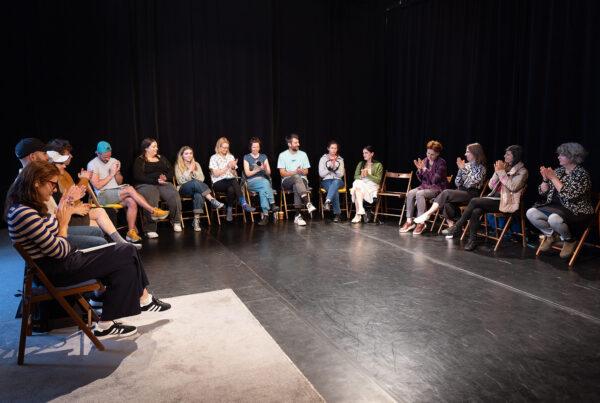Reflections on the 50th anniversary of Grips Theater Berlin
Shortened version of a Lecture held by Stefan Fischer-Fels at Grips Symposium “On the child’s side”
June 12th 2019
For Portugese, click here / leia em portugues
Respect towards children is the basis of our work. Children’s theatre puts forward the same question as the “adult theatre”: How do we want to live together in the future? The children’s theatre itself is part of the realization of children’s rights. It is a “safe space” for the soul and body of children. In our western European countries we have, compared to other regions of the world, fantastic conditions to create TYA. We should use our privileges to go ahead, try new, push the limits of what is possible in TYA – and work on international collaborations.
A theatre is always more than a single performance. It’s a Complete Work of Art (“Gesamtkunstwerk”) that sends signals to the society and, doing so, influences and changes society step by step. Theatre must become a role model for the future society:
Let’s have a look at the audience, the people working in theatre and the program of children’s theatres.
Children's theatre in Germany is 70% founded on contact with schools. That’s fantastic as a basis. But the children's right to experience culture is better realised when children and youngsters approach these places through their own decision-making. We are far away from that in Germany. We need strategies like
- Moving into public spaces
- Participation of youngsters in structural decisions
- More “young” wild and crazy plays (made by young artists), less “education”
Theatres in Germany are increasingly becoming “cultural centers”, meeting points, places of discourse for an international and transcultural society, that talk to each other instead of fighting against each other. We witness fundamental changes in the political, economic and social structures and strategies of our lives globally, changes that infect and affect our children. We have to understand these “transformations”; then look at the consequences for the reality of children – and then find an artistic expression to talk about it.
We could, for example, give children and youngsters an awareness that the wealth and prosperity of western European countries is the result of a long process of global violent exploitation of other cultures – a process that is still going on. Pankay Mishra talks about this in his book “Age of Anger”; he says that the western countries are now getting the bill: refugees, climate catastrophes, a global racist populism, etc. The “model” of the western countries has no credibility anymore when walls are built and humans are killed just so that we can save our wealth.
One of the central issues of the 21st century is diversity. The audience in Germany is already very diverse. Is TYA well prepared for this diversity concerning both program and people? Mark Terkessidis, 10 years ago, wrote about the “intercultural alphabetisation of society” as a necessity. Who is speaking on our stages? Who is working as a dramaturg, artistic director, theatre pedagogue, actor, author, director, etc.? Diversity is not yet self-evident in Germany.
Colonialism and diversity are topics for stories that children should be told in TYA. We should also talk about the crisis of democracy. We have to learn a new language for communication between different communities. The task of a theatre is to combine different “bubbles” and bring them into a dialogue, e.g., through the participation of children in artistic processes and practices as a democratic laboratory which could work as a training in human relationships.
Digitalisation is a hot topic. Especially for children. They are already living in two worlds. Do we understand what happens on “the other side”? How are we reflecting digitalisation in our theatres? I just read the chapter about “Artificial Intelligence” in Harari's book “21 lectures about the 21st century”. I understood that in the near future there will be radical new ethical questions as a challenge for the theatre.
Everybody’s talking about “climate change”. Young people nowadays are raising the question of whether we as adults, proclaiming idealistic messages from the stage, at the same time are leaving behind a disgraceful inheritance for the next generation. “Fridays for Future” is a movement that asks adults: What are you doing? Where have you been in the last 30 years? The power of this question should force us to think about our behaviour, our artistic work and our lives, before we talk about “changing the world” to children.
The question of “gender” and the “MeToo” debate is already a big issue in theatre. But what about in TYA? How are we being role models for “gender justice”? Which heroes and heroines are shown on stage? How do we show girls and boys, mothers and fathers, teachers on stage? What kind of actors are engaged in TYA? Do we have as many attractive roles for girls, as for boys? Do we show “cliches” or differentiated pictures of masculinity and femininity?
Everywhere we put signals and they have an impact on children.
For all that, we need innovation.
Maybe we have to forget our old knowledge that does not help us to understand the gigantic changes we are living in. UNLEARNING is a strategic concept of “change management” and it helps to free the brain and open it to new thinking. Innovation means to fight for new ideas, go down paths that nobody trod before and find contemporary expression. Every new generation gives impulses to change the world and the theatre. That is their right. The task of a theatre is to accept and reflect new impulses. Our task is not only to listen to children but also to understand the trends and tendencies in social developments, to find the words and pictures to answer the questions of arts: What does it mean to be a human being?
We are talking about the “big transformation of society” – how do we make art out of that? That is the only task we have. Artistic work means research, invention, radicalism, questioning the “established”. How can we fascinate our audience without presenting “fast-food”? Complex questions, differentiated language, unusual strategies of storytelling – all that is possible if the audience has been led to experiment, to decode complex artistic codes. That is our educational mandate. Research for new ideas and new forms of living together in a society which is already diverse. There are no complete answers. There is only the experiment with and development of new artistic strategies.
The most important question is about quality. We need the best for TYA. So we need to ask the best authors, directors and actors to join the TYA, starting from the educational system of artists and ending the system of the 'superstars' of adult theatre. We need to develop programs to improve the children’s rights to “great art” in TYA.
Theatre institutions themselves are slaves of the curriculum at schools and the conservative expectations of teachers. Are we really free and independent in our artistic work? What are our concepts to challenge schooling aesthetically and politically?
Childhood in industrialised nations is no paradise; it’s a high performance center with occasional entertainment in order to cope with the pressure of meritocracy.
Theatres are involved. We are living under the rule of the economy. We have to sell tickets. We are slaves of income and capacity utilisation. Not fighters for research, experiment, curiosity. Are we ready to fight for unusual artistic work, nonlinear storytelling, ambivalent messages? Are we ready to admit our own uncertainty? Are we ready for controversial discussions? Are we ready to protect our artists?
We have a credibility problem talking about “children’s rights” and “another world is possible”- while living and acting something else. Every scene on stage is a role model. Which concept is appropriate for children? “You will only be loved if you can show your weakness without provoking strength.” ("Geliebt wirst du einzig, wo du schwach dich zeigen darfst, ohne Stärke zu provozieren." Theodor W. Adorno, "Minima Moralia")
Children have the right to experience arts and culture, not the right that theatres solve their problems. Theatre is about empathy, emotion, training of the compassion, in order to be ready for dialogue in times where dogmatic persons rule. Not to have to be right – that is the most wonderful privilege in the field of theatres. Theatre is able to listen to other opinions, to go into conflict, to put questions instead of answers.
We as theatre makers have the responsibility to make the new and complicated happen. Some performances are far from expectations. We have to make them possible. Much too often we leave it to the “market” – to parents, teachers, etc. If it does not work immediately – it will be excluded from the schedule. We are afraid to lose funding. We are afraid to sell too few tickets. We are afraid to be politically incorrect. Fear and pressure are not the best advisors for those children’s rights advocates who want to encourage children through theatre. We should question the fear; we should discuss the controversy in a peaceful manner. The next generation will be influenced by the topics and by the courage we have to introduce new aesthetics to the children. All aesthetic means are appropriate for children. They will follow every path if they understand the rules.
There is a text, written by Walter Benjamin, called “Angel of history”, looking at Paul Klee's painting ANGELUS NOVUS. “His face is turned toward the past. Where we perceive a chain of events, he sees one single catastrophe which keeps piling wreckage upon wreckage and hurls it in front of his feet. The angel would like to stay, awaken the dead, and make whole what has been smashed. But a storm is blowing from Paradise; it has got caught in his wings with such violence that the angel can no longer close them. The storm irresistibly propels him into the future to which his back has turned, while the pile of debris before him grows skyward. The storm is what we call progress.“
Dear Grips Theater: Let yourself be carried away by the storm. Look ahead. Into the open.
Stefan Fischer-Fels, born 1964 in Berlin, was 1993-2003 theatre pedagogue and dramaturg and 2011-2016 artistic director at Grips Theater Berlin. Since 2016 he is Artistic Director of Junges Schauspiel Düsseldorf. Since 2011 he is a member of Executive Committee of ASSITEJ International.




